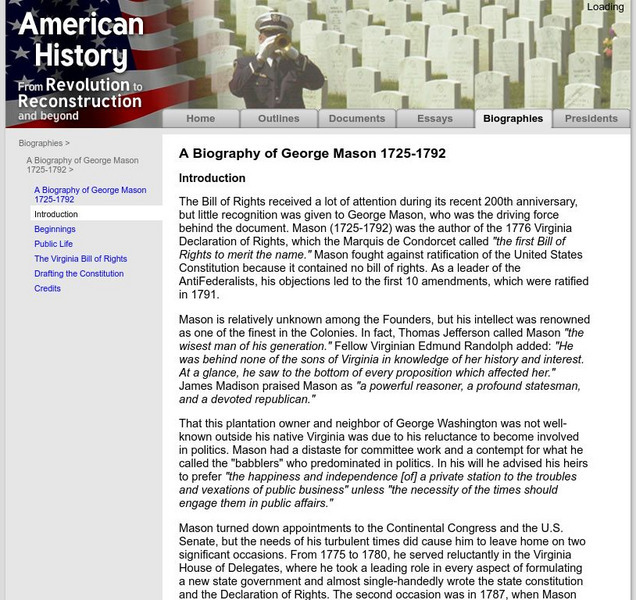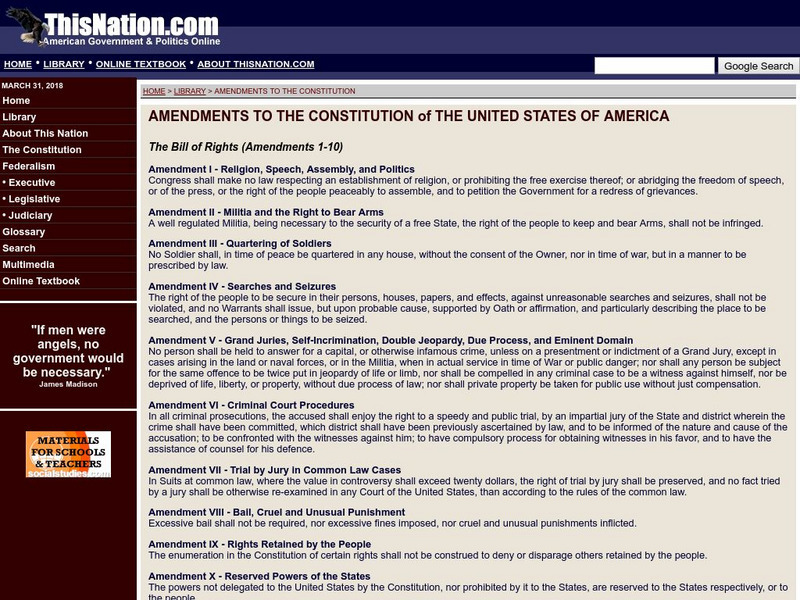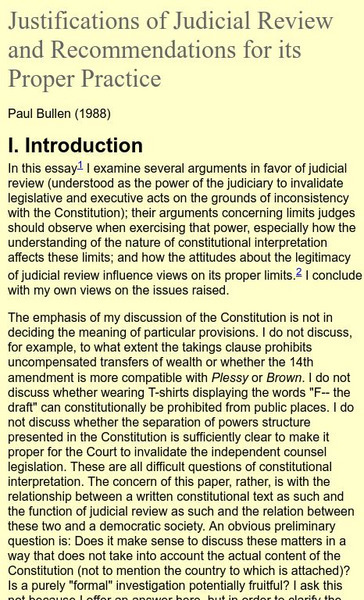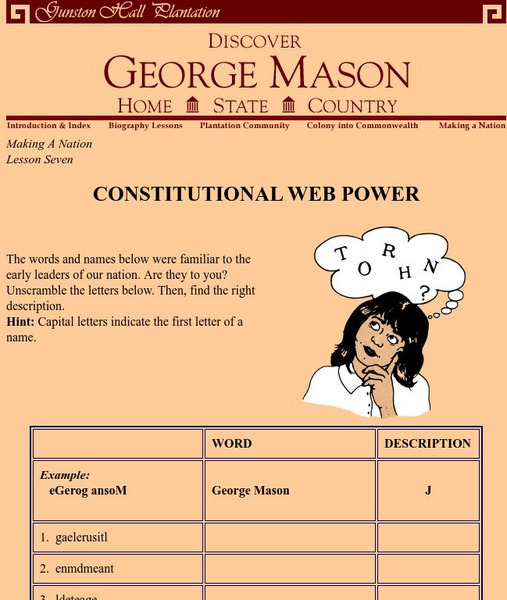iCivics
I Civics: Limiting Government
Explore the five basic limits on government through the true story of Peruvian president Alberto Fujimori, and other fictional cases of government power gone wild.
Khan Academy
Khan Academy: Us History: 1754 1800: Unit Test
Take this eleven question unit test over US history during the period of 1754 and 1800.
Khan Academy
Khan Academy: Us History: 1754 1800: Quiz 2
A quick comprehension check over the period in US history when the constitution was being established.
Khan Academy
Khan Academy: Us History: 1754 1800: The Constitutional Convention
Shortly after the end of the Revolutionary War, American leaders realized that the nation needed a new, stronger Constitution. But what would the new system of government look like?
Khan Academy
Khan Academy: Us History: 1754 1800: The Federalist Papers
In the Federalist Papers, Alexander Hamilton, James Madison and John Jay made the case for ratifying the new US Constitution.
Khan Academy
Khan Academy: Us History: 1754 1800: The Bill of Rights
The first ten amendments to the US Constitution guarantee citizens' essential freedoms and rights.
iCivics
I Civics: Judicial Review
This lesson plan explores the case that established the power the Supreme Court has today. Learners will learn how the decision in Marbury v. Madison influenced the structure of the third branch, and how the Court's use of judicial...
iCivics
I Civics: Amendment Mini Lesson
This mini-lesson plan highlights the Constitution's amendments. Students will learn about some of the most critical additions to our Constitution and how those additions guarantee their rights.
iCivics
I Civics: No Bill of Rights, No Deal
In the debate over the Constitution, the Bill of Rights was a deal-breaker. In this lesson, learners learn why the federalists thought the Constitution didn't need a bill of rights and why the anti-federalists refused to accept the...
Ohio State University
Osu History Teaching Institute: u.s. Constitution: The Preamble
Students will be able to explain the meaning of the Preamble to the Constitution.
iCivics
I Civics: Sources of Law
This lesson teaches students about the sources, types, and unique systems of law that exist in the United States. They learn about sources of law from the Constitution to local ordinances and also compare and contrast civil and criminal...
University of Groningen
American History: Biographies: George Mason 1725 1792 Introduction
This site is provided for by the University of Groningen. Leader of the Anti-federalist faction against strong national government, Mason fought the ratification of the U.S. Constitution for protection for individual rights; read this...
This Nation
This nation.com: Amendments to the u.s. Constitution
This site provides the text of all the amendments to the U.S. Constitution. The first ten are the Bill of Rights.
University of Groningen
American History: Outlines: Benjamin Franklin's Rising Sun
Franklin, as the oldest delegate to the Constitutional Convention, recognized the arguments against the proposed new government and the strength of the Federalists. The essay gives insight into Franklin's views on the drafted...
University of Groningen
American History: Biographies: William Paterson
This resource features a detailed biography on the politician from New Jersey who advocated for states' rights.
Digital History
Digital History: The Oldest Written National Framework of Government
See how unique the U.S. Constitution has been over the 200 plus years of our government.
Scholastic
Scholastic: u.s. Constitution Changes With the Times
Clear, concise overview of the "voting" amendments to the Constitution. Includes quotes from 20th century Justices and Presidents about Amendments they thought were needed.
Geographic
Nicaragua Government
Factual information on the government of Nicaragua. Includes information on each branch of government as well as political parties. Information current to 1999.
Other
Furman University: John C. Calhoun's Address of 1849
This speech by John C. Calhoun was directed at the South, describing their problem, and what the North has done with the Government without the nation's consent. It was signed by the Congressmen from twelve southern states.
Other
Paul Bullen: Judicial Review
This site is a personal site from Paul Bullen that provides an essay titled "Justifications of Judicial Review and Recommendations for its Proper Practice," which addresses the process of judicial review in great depth.
University of Missouri
Exploring Constitutional Conflicts: Constitutional Trivia Quiz
Are you a law school drop out or a Supreme Court justice? Take this trivia quiz over the Constitution and find out! Self-correcting and answers are provided.
Other
Gunston Hall Plantation: Constitutional Web Power
Review some of the players and concepts of the Constitutional period. The words and names featured were familiar to the early leaders of our nation. Unscramble the letters, then find the right description.
Other
Positive Atheism: The Philosophy of Paine
This site displays the text as delivered by Thomas A. Edison about the philosophies of Thomas Paine (1737-1809 CE). According to Edison, Paine is one of the great members of society who was never recognized for his outstanding achievements.



















